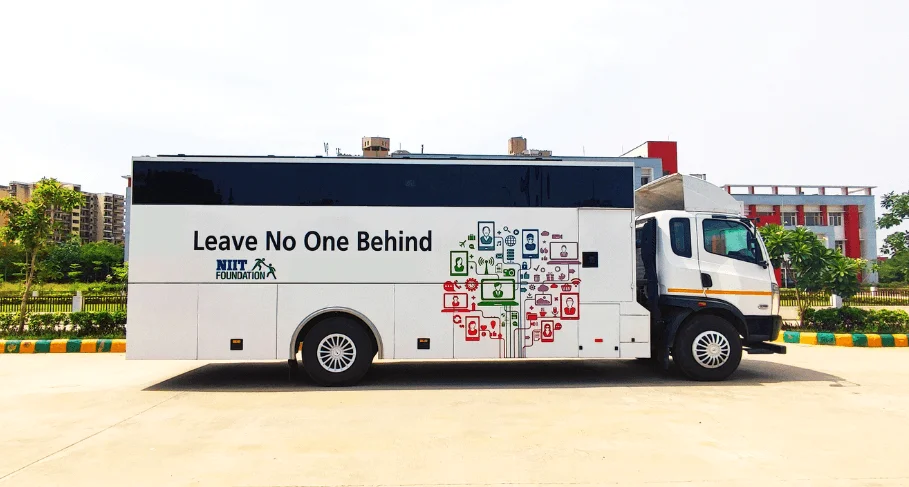The NIIT Foundation’s Digital Bus Initiative addresses the digital divide in India by providing technology and skill training to remote and underserved regions. The initiative already operates 16 Digital Buses in eight states, including Chhattisgarh, Haryana, Jharkhand, Uttar Pradesh, Maharashtra, Delhi, Uttarakhand, and Madhya Pradesh. It plans to deploy six more buses in five other states.
Each solar-powered bus in the initiative is a mobile classroom equipped with broadband, computing devices, and a video conferencing tool. A dedicated four-person team provides hands-on training in digital literacy, financial skills, cybersecurity, information technology, and entrepreneurship. Over 50,000 people, including 50% women, have benefited from this effort, which promotes holistic growth across 45 villages.
Commenting on the development, Charu Kapoor, Country Director of NIIT Foundation, said:
By creating a classroom on the wheels, the sound of engines can be seen powering the flame of learning. Digital buses are changing the educational landscape in remote areas, transforming remote areas into lively learning centres and offering unprecedented societal connectivity. To cross the barriers and provide resources wherever they are needed directly, we’re not only making the communities empowered but also serving the future of the world around us better all at the same time.
The programme aims to lower the digital divide by normalizing technology for daily living and deepening community learning. It promotes teamwork and social acumen and empowers rural youth to view technology as a personal and career development method. It also allows marginalized communities to engage in the digital economy on an equal footing.
Isha Joshi, a beneficiary from Kaladhungi village in Uttarakhand, highlighted the programme’s impact:
I never imagined how much a free computer course could transform my life. All of a sudden, after my accident, I thought that my dreams were gone, but this programme has given me a new life. Not only did it provide me with fundamental computer abilities, but it also restored my assertiveness. I went from being teased for not knowing computers to becoming the class CR and helping my peers with their projects. This programme has empowered me to stand tall and repay my family’s sacrifices for my Education.
Working on the ground to deliver education, Karan Mehta, trainer at Digital Bus, added:
Education is often more than simply teaching fundamental computer literacy. As a trainer aboard the Digital Bus, I help people see themselves in empowering ways. We go to the underserved villages, set up mobile learning facilities, and ensure everyone is cared for, no matter where they start. Seeing them discover how to make an email, delve into digital tools or use the internet for the first time is very rewarding. It’s not just skills we’re imparting; we’re fostering confidence, independence, and a sense of possibility that transforms lives and uplifts entire communities.
In 2004, the promoters of NIIT established the NIIT Foundation, a non-profit education society (NGO). The organization’s mission is to improve the lives of the underprivileged in the country through educational and skill development initiatives. The Foundation has set up skill development and vocational training centres in urban and rural areas that offer placement support to all eligible students. It has delivered projects ranging from customized CSR activities, school programmes, college collaborations, community initiatives, career and skill development courses, digital literacy and financial literacy programmes. NIIT Foundation educational programmes also focus on giving girls access to Education and a career. In addition, it supports other NGOs by providing training support and building their capacity.


